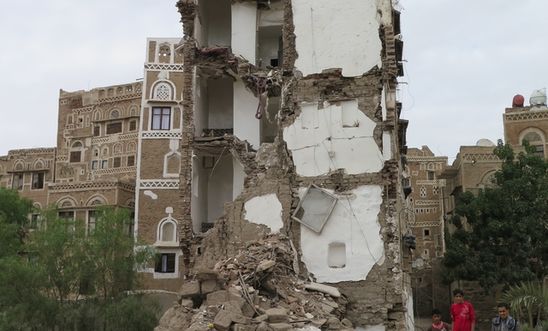
Press releases
Saudi-led airstrikes in Yemen have left a 'bloody trail of civilian death' - new report

With nearly 2,000 civilian deaths, all parties may have committed war crimes
Saudi Arabia-led coalition airstrikes and attacks by pro- and anti-Huthi armed groups in Ta’iz and Aden in Yemen have killed scores of civilians - including dozens of children - and could amount to war crimes, Amnesty International says as it published a new report today (18 August).
In its 45-page report - ‘Nowhere safe for civilians’: Airstrikes and ground attacks in Yemen - Amnesty has investigated eight airstrikes by the Saudi Arabia-led coalition which killed at least 141 civilians and injured 101 others, mostly women and children, during field research in Yemen in June and July.
The evidence gathered reveals a pattern of strikes targeting heavily-populated areas including civilian homes, a school, a market and a mosque. In the majority of cases no military target could be located nearby.
One resident describing the aftermath of an attack on a residential compound inhabited by power plant workers in Mokha on 24 July said “corpses and heads” were scattered everywhere “engulfed by fire and ashes”, comparing the sight to a scene from “Judgement Day”. Another local resident told Amnesty he continued to be haunted by the memories of walking through the “pools of blood and severed limbs” of more than 20 victims. A coalition attack on 9 July killed ten members of one family, including four children, who had sought shelter at a school in north Aden after being displaced from their home because of fighting. “We came here to escape the war,” the father of three young women who were killed in the strike told Amnesty, “we had nowhere else to go”.
Another unlawful airstrike on 7 July killed 11 worshippers at a mosque in Waht, north Aden. Meanwhile, witnesses to an airstrike a day earlier at a livestock market, also in north Aden, gave gruesome accounts of the bloodshed to Amnesty. One survivor described how shrapnel slashed open his abdomen, causing damage to his internal organs. Another eyewitness described the scene as “a massacre”. “Body parts and blood of humans and animals were mixed together”.
Amnesty International Senior Crisis Response Advisor Donatella Rovera said:
“The report depicts in harrowing detail the gruesome and bloody trail of death and destruction in Ta’iz and Aden from unlawful attacks, which may amount to war crimes, by all parties.“Civilians in southern Yemen have found themselves trapped in a deadly crossfire between Huthi loyalists and anti-Huthi groups on the ground, while facing the persistent threat of coalition airstrikes from the sky. All the parties to this conflict have displayed a ruthless and wanton disregard for the safety of civilians.“Coalition forces have blatantly failed to take necessary precautions to minimise civilian casualties, an obligation under international humanitarian law. Indiscriminate attacks that result in death or injury to civilians amount to war crimes.“Perpetrators of the callous attacks against civilians in Yemen need to know that they will pay the price and will be held responsible for war crimes.”
Attacks by armed groups fighting on the ground
Amnesty also investigated 30 attacks in Aden and Ta’iz by the Huthi armed group, supported by armed and security forces loyal to former President Ali Abdullah Saleh, and anti-Huthi armed groups battling each other on the ground, killing at least 68 civilians and injuring 99 others.
Fighters from both parties routinely used imprecise weapons including Grad-type rockets, mortars and artillery fire in densely-populated residential areas, displaying utter disregard for the safety of civilians. Such indiscriminate attacks may amount to war crimes.
In one attack, rockets fired into Aden’s al-Mansoura neighbourhood on 1 July struck two hotels where displaced families had been sheltering. Among the worst injured civilians were Amal Ali and her 18-month-old baby. “Shrapnel penetrated his head and went through to his left eye, causing internal damage,” she said of her child. “He lost his eye and is in a coma.” Four more of her family members including her three-month-old baby son were also injured. The same attack left a 55-year-old woman paralysed from the neck down.
One of the deadliest attacks on 19 July was carried out by the Huthis and their allies on Dar Saad, in Aden, where 45 people were killed, most civilians.
Many attacks appeared to have been launched from within densely-populated civilian neighbourhoods in violation of international humanitarian law. One resident described how civilians are caught up amidst the fighting: “They fight and we are caught in the middle, but we don’t have anywhere else to go.”
In several cases children were killed or injured while playing in the streets or near their homes. The report also contains several disturbing and grisly accounts from eyewitnesses and survivors describing bodies being sliced open and severed body parts. An eyewitness to one attack described a child running towards him with blood running down his neck and a hole in his head from shrapnel and “pieces of brains smeared on the walls and windows”.
UN Commission of Inquiry needed
Amnesty is calling on the United Nations Human Rights Council to create an international commission of inquiry to independently and impartially investigate alleged war crimes in Yemen. By 4 August, fighting in the country had resulted in at least 1,916 civilian deaths according to the UN, with at least 207 civilian objects, including property and infrastructure, completely or partially destroyed. The suffering of civilians in southern Yemen has also been intensified by an acute humanitarian crisis, with at least 80% of the population in need of humanitarian assistance. Essential services including access to clean water and electricity are cut off and food prices have sky-rocketed. Damage to key logistical infrastructure, including bridges, airports and seaports, has also severely hampered the movement of crucial humanitarian supplies. Access to health care is also limited with medical centres shut down, frequent attacks on medical staff and dwindling supplies of electricity, fuel, medication and surgical equipment.